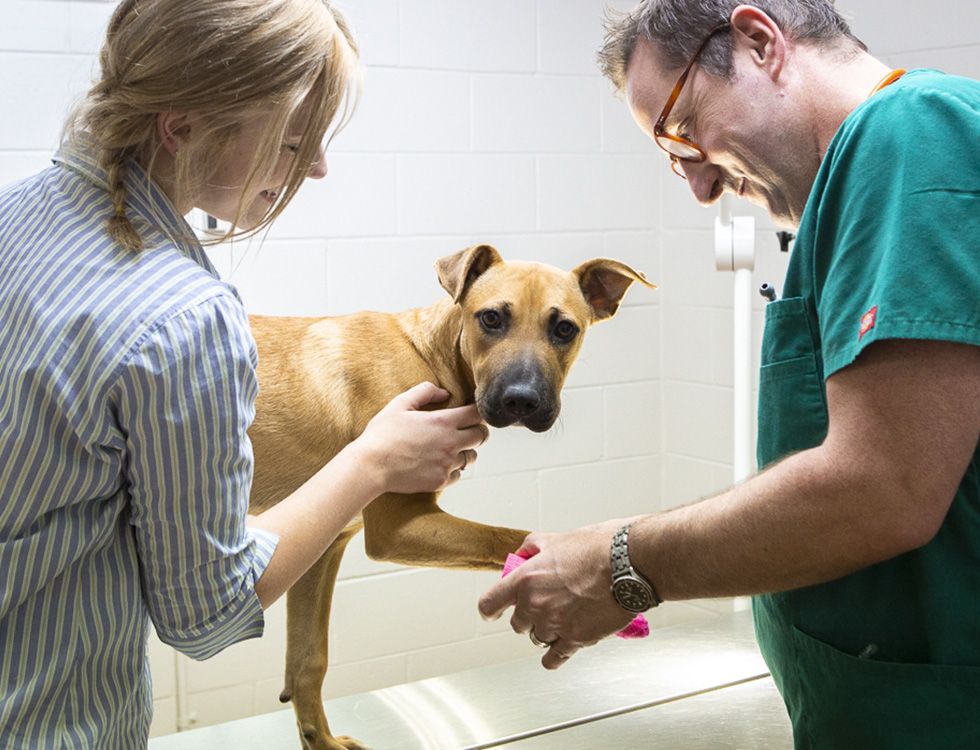Desexing
At Hampton Park, we know that desexing is more than just an important part of responsible pet ownership.
Why Desex Your Pet?

Simply put, desexed pets live longer…and we all want our pets to live a long time!
- Speyed female cats live, on average, 5 years longer than their unspeyed mates; for neutered males, it’s 7 years.
- Desexed dogs can have an extra 2 years.
- Desexed pets are generally free from breast, womb, and testicular cancers or womb and prostate infections.
- You can also expect a more social family member with a reduced desire to roam. Your canine and feline mates are less likely to get into fights or get struck by a car. In males, it can even reduce urine marking habits and general aggression.
It’s a safe and effective way to prevent unwanted litters of kittens, puppies, and rabbits. As sweet as they can be, pet overpopulation is still a very real problem in our community. We use a sterile, state-of-the-art surgical space to ensure that pets have a safe desexing procedure.
A Safe Surgery,
A Happy Life
For a long and happy life, we recommend the desexing of all pets in Lynbrook and all surrounding areas. The safety and wellbeing of your pet are important to us. Our veterinary surgeons have years of experience performing desexing procedures, including speying and neutering, from careful examinations before the surgery to advanced monitoring while under anaesthesia to monitoring them post-op. We want to make sure your pet has as stress-free an experience as possible.
Desexing Cats and Dogs
Getting a pet living in Lynbrook microchipped can be especially important if you plan to move now or in the future. No matter where you go or how adventurous your pet is, that microchip will go with them. Unlike collars, a pet microchip cannot fall off or be easily removed. Remember to keep your contact information updated if you change addresses or phone numbers. All pets microchipped at Hampton Park Veterinary Hospital are registered at Central Animal Records or Australian Animal Records. Please contact the above organisations directly to update your pet’s information. If you microchipped your pet elsewhere and are unsure which microchip organisation holds their details, you can find out by visiting Pet Address.
Desexing Rabbits
With a short pregnancy and mating happening as early as four months of age, bringing your rabbits in for desexing is essential so that their population doesn’t quickly expand out of control.
Desexing your rabbit can help with more than just unexpected breeding.
- As social yet territorial animals, rabbits are prone to fighting with one another, which can lead to serious injuries and wounds.
- Desexing can help reduce territorial behavior and urine spraying in both males and females.
- Rabbit does (females) can be safe from cancer or infection of the womb, both of which are very common.
Desexing rabbits also reduces urine spraying, territorial fighting, and cancers of the reproductive organs in both males and females. Bring in your Narre Warren South rabbit for a rabbit spey or rabbit neuter to ensure a happier and healthier life.

For more information about pet surgical procedures here at Hampton Park, please see our Surgeries Page.
Caring For Life
Centrally located, Hampton Park Veterinary Hospital provides pet microchipping for pets in Hampton Park, Lynbrook, Narre Warren South, and the surrounding areas, including Narre Warren North, Lyndhurst, Berwick, Hallam, Doveton, Dandenong South, Cranbourne, Cranbourne East, Cranbourne West, Cranbourne South, and Endeavour Hills.





